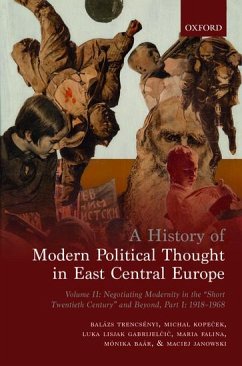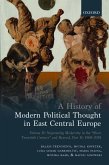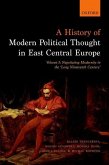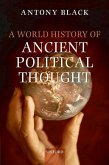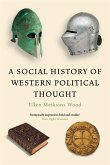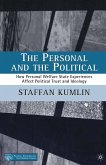Balazs Trencsenyi, Michal Kopecek, Luka Lisjak Gabrijelcic
History of Modern Political Thought in East Central Europe
Volume II: Negotiating Modernity in the 'short Twentieth Century' and Beyond, Part I: 1918
Balazs Trencsenyi, Michal Kopecek, Luka Lisjak Gabrijelcic
History of Modern Political Thought in East Central Europe
Volume II: Negotiating Modernity in the 'short Twentieth Century' and Beyond, Part I: 1918
- Gebundenes Buch
- Merkliste
- Auf die Merkliste
- Bewerten Bewerten
- Teilen
- Produkt teilen
- Produkterinnerung
- Produkterinnerung
This volume begins with examining the repercussions of the collapse of multinational empires in the region after World War I, and analyzes the multiple cycles of democratization and authoritarian backlash.
Andere Kunden interessierten sich auch für
![A History of Modern Political Thought in East Central Europe A History of Modern Political Thought in East Central Europe]() Balazs TrencsenyiA History of Modern Political Thought in East Central Europe167,99 €
Balazs TrencsenyiA History of Modern Political Thought in East Central Europe167,99 €![A History of Modern Political Thought in East Central Europe A History of Modern Political Thought in East Central Europe]() Balazs TrencsenyiA History of Modern Political Thought in East Central Europe186,99 €
Balazs TrencsenyiA History of Modern Political Thought in East Central Europe186,99 €![A World History of Ancient Political Thought A World History of Ancient Political Thought]() Antony BlackA World History of Ancient Political Thought115,99 €
Antony BlackA World History of Ancient Political Thought115,99 €![A Social History of Western Political Thought A Social History of Western Political Thought]() Ellen Meiksins WoodA Social History of Western Political Thought22,99 €
Ellen Meiksins WoodA Social History of Western Political Thought22,99 €![The Personal and the Political The Personal and the Political]() S. KumlinThe Personal and the Political41,99 €
S. KumlinThe Personal and the Political41,99 €![Explorations in African Political Thought Explorations in African Political Thought]() Explorations in African Political Thought206,99 €
Explorations in African Political Thought206,99 €![End of an Era End of an Era]() Carl MinznerEnd of an Era42,99 €
Carl MinznerEnd of an Era42,99 €-
-
-
This volume begins with examining the repercussions of the collapse of multinational empires in the region after World War I, and analyzes the multiple cycles of democratization and authoritarian backlash.
Hinweis: Dieser Artikel kann nur an eine deutsche Lieferadresse ausgeliefert werden.
Hinweis: Dieser Artikel kann nur an eine deutsche Lieferadresse ausgeliefert werden.
Produktdetails
- Produktdetails
- Verlag: Hurst & Co.
- Seitenzahl: 482
- Erscheinungstermin: 1. Januar 2019
- Englisch
- Abmessung: 236mm x 155mm x 36mm
- Gewicht: 862g
- ISBN-13: 9780198737155
- ISBN-10: 0198737157
- Artikelnr.: 54547924
- Herstellerkennzeichnung
- Libri GmbH
- Europaallee 1
- 36244 Bad Hersfeld
- gpsr@libri.de
- Verlag: Hurst & Co.
- Seitenzahl: 482
- Erscheinungstermin: 1. Januar 2019
- Englisch
- Abmessung: 236mm x 155mm x 36mm
- Gewicht: 862g
- ISBN-13: 9780198737155
- ISBN-10: 0198737157
- Artikelnr.: 54547924
- Herstellerkennzeichnung
- Libri GmbH
- Europaallee 1
- 36244 Bad Hersfeld
- gpsr@libri.de
Balázs Trencsényi is Professor in the Department of History, Central European University Budapest. His research focuses on the comparative history of political thought in East Central Europe and the history of historiography. He is Co-Director of Pasts, Inc., Center for Historical Studies at CEU and Editor of the periodical East Central Europe (Brill). His publications include A History of Modern Political Thought in East Central Europe: Volume I: Negotiating Modernity in the 'Long Nineteenth Century' (with Maciej Janowski, Monika Baar, Maria Falina, and Michal Kope¿ek, OUP, 2016), The Politics of 'National Character': A Study in Interwar East European Thought (Routledge, 2012), Whose Love of Which Country?: Composite States, National Histories and Patriotic Discourses in Early Modern East Central Europe (Brill, 2010), and Hungary and Romania beyond National Narratives: Comparisons and Entanglements (Peter Lang, 2013). Michal Kope¿ek is Head of the Ideas and Concepts Department at the Institute of Contemporary History in Prague, and Co-Director of Imre Kertész Kolleg, Friedrich Schiller University in Jena. His publications include A History of Modern Political Thought in East Central Europe: Volume I: Negotiating Modernity in the 'Long Nineteenth Century' (with Balázs Trencsényi, Maciej Janowski, Monika Baar, Maria Falina, OUP, 2016), and Quest for the Revolution's Lost Meaning: Origins of the Marxist Revisionism in Central Europe, 1953-1960 (forthcoming Brill, 2018). Luka Lisjak Gabrijel¿i¿ is a PhD candidate at the program in Comparative History of Central, Southeastern and Eastern Europe at the Central European University, Budapest. His main fields of interest include intellectual history, nationalism, and history of political thought, with a focus on European peripheries and semi-peripheries. He co-authored a volume on modern radical ideologies ( Utopije demokracije, ZNK Masovna, 2005), and edited a volume on humanism in contemporary social and political thought ( Blodnjaki smisla: misliti humanizem danes, DHG, 2007). He is the editor of the Slovenian quarterly journal Razpotja. Maria Falina is Lecturer in Modern European History at Dublin City University. Her main fields of interest are intellectual history, nationalism, and history of religion and politics. Her publications include A History of Modern Political Thought in East Central Europe: Volume I: Negotiating Modernity in the 'Long Nineteenth Century' (with Balázs Trencsényi, Michal Kope¿ek, Maciej Janowski, and Monika Baar, OUP, 2016), and articles such as 'Between "Clerical Fascism" and Political Orthodoxy: Orthodox Christianity and Nationalism in Interwar Serbia' in Totalitarian Movements & Political Religions, (2007) 8/2: 247-258, and 'Religion Visible and Invisible: The Case of Post-Yugoslav Anti-War Films', in C. Schmitt and L. Berezhnaya, eds. Iconic Turn(s): Religion and Nation in East European Films after 1989 (Brill, 2013). Mónika Baár is Professor of Central European Studies at the University of Leiden. Her research focuses on modern historiography, cultural history and political thought, with special attention to the problem of marginality. Her publications include A History of Modern Political Thought in East Central Europe: Volume I: Negotiating Modernity in the 'Long Nineteenth Century' (with Balázs Trencsényi, Michal Kope¿ek, Maciej Janowski, and Maria Falina, OUP, 2016), and Historians and the Nationalism: East-Central Europe in the Nineteenth Century (OUP, 2010). She is Associate Editor of Nationalities Papers. Maciej Janowski is Head of Section at the Institute of History, Polish Academy of Sciences, Warsaw and Visiting Professor at the Central European University, Budapest. His main fields of interest are social and intellectual history of Central Europe and the history of liberalism. He is editor of the periodical East Central Europe (Brill) and Deputy Editor of Kwartalnik Historyczny. His publications include A History of Modern Political Thought in East Central Europe: Volume I: Negotiating Modernity in the 'Long Nineteenth Century' (with Balázs Trencsényi, Michal Kope¿ek, Mónika Baár, and Maria Falina, OUP, 2016), and Polish Liberal Thought before 1918 (CEU Press, 2004).
* Part I: Transcending Modernity: Interwar and Wartime Visions of
Regeneration
* 1: Nation-State Building and its Alternatives
* 2: Liberalism on the Defensive
* 3: The Many Faces of Leftism
* 4: The 'Third Way'
* 5: Towards a Conservative Revolution
* 6: A New State for 'New Men'
* 7: World War II: Collaboration, Resistance, and Visions of the
Postwar Orde
* Part II: Hybridized Modernity: Communism, Reformism, and Dissent in a
Divided Europe
* 8: The Postwar 'Transition Years'
* 9: Stalinism and De-Stalinization
* 10: Towards Socialism with a Human Face?
Regeneration
* 1: Nation-State Building and its Alternatives
* 2: Liberalism on the Defensive
* 3: The Many Faces of Leftism
* 4: The 'Third Way'
* 5: Towards a Conservative Revolution
* 6: A New State for 'New Men'
* 7: World War II: Collaboration, Resistance, and Visions of the
Postwar Orde
* Part II: Hybridized Modernity: Communism, Reformism, and Dissent in a
Divided Europe
* 8: The Postwar 'Transition Years'
* 9: Stalinism and De-Stalinization
* 10: Towards Socialism with a Human Face?
* Part I: Transcending Modernity: Interwar and Wartime Visions of
Regeneration
* 1: Nation-State Building and its Alternatives
* 2: Liberalism on the Defensive
* 3: The Many Faces of Leftism
* 4: The 'Third Way'
* 5: Towards a Conservative Revolution
* 6: A New State for 'New Men'
* 7: World War II: Collaboration, Resistance, and Visions of the
Postwar Orde
* Part II: Hybridized Modernity: Communism, Reformism, and Dissent in a
Divided Europe
* 8: The Postwar 'Transition Years'
* 9: Stalinism and De-Stalinization
* 10: Towards Socialism with a Human Face?
Regeneration
* 1: Nation-State Building and its Alternatives
* 2: Liberalism on the Defensive
* 3: The Many Faces of Leftism
* 4: The 'Third Way'
* 5: Towards a Conservative Revolution
* 6: A New State for 'New Men'
* 7: World War II: Collaboration, Resistance, and Visions of the
Postwar Orde
* Part II: Hybridized Modernity: Communism, Reformism, and Dissent in a
Divided Europe
* 8: The Postwar 'Transition Years'
* 9: Stalinism and De-Stalinization
* 10: Towards Socialism with a Human Face?

